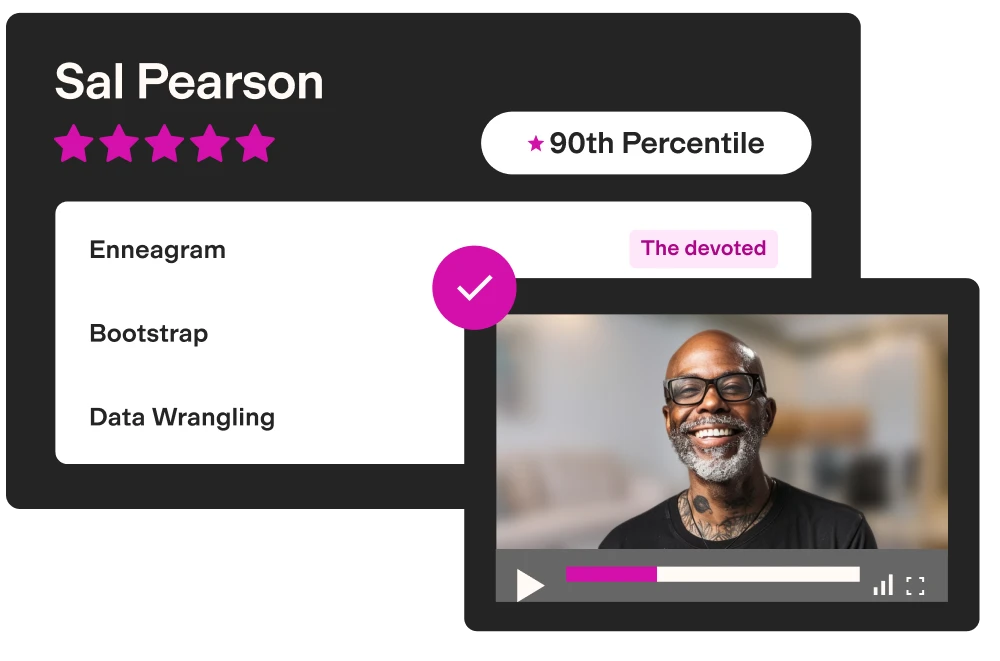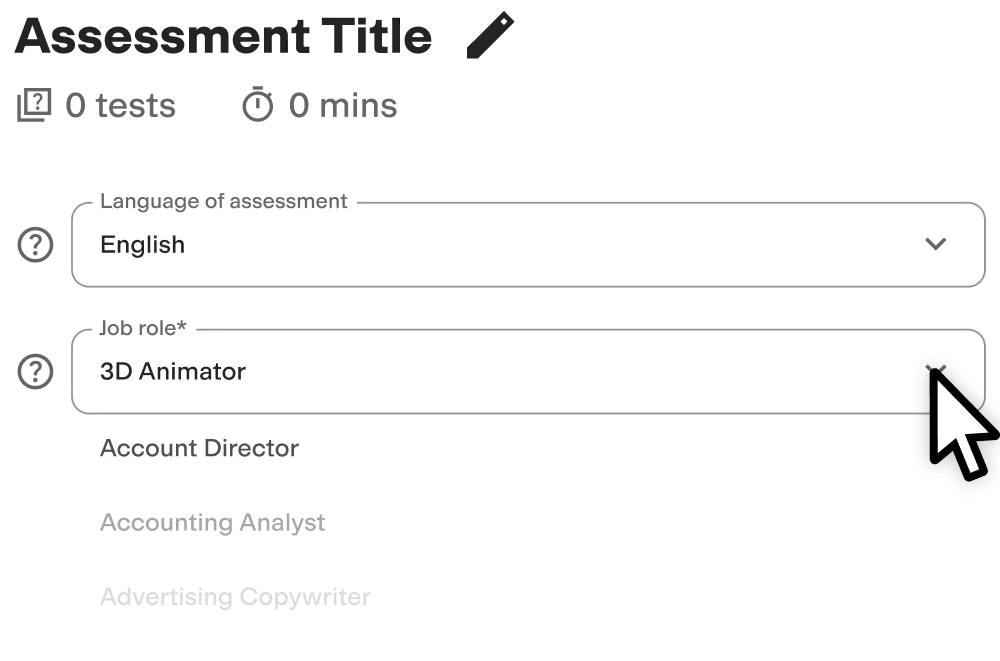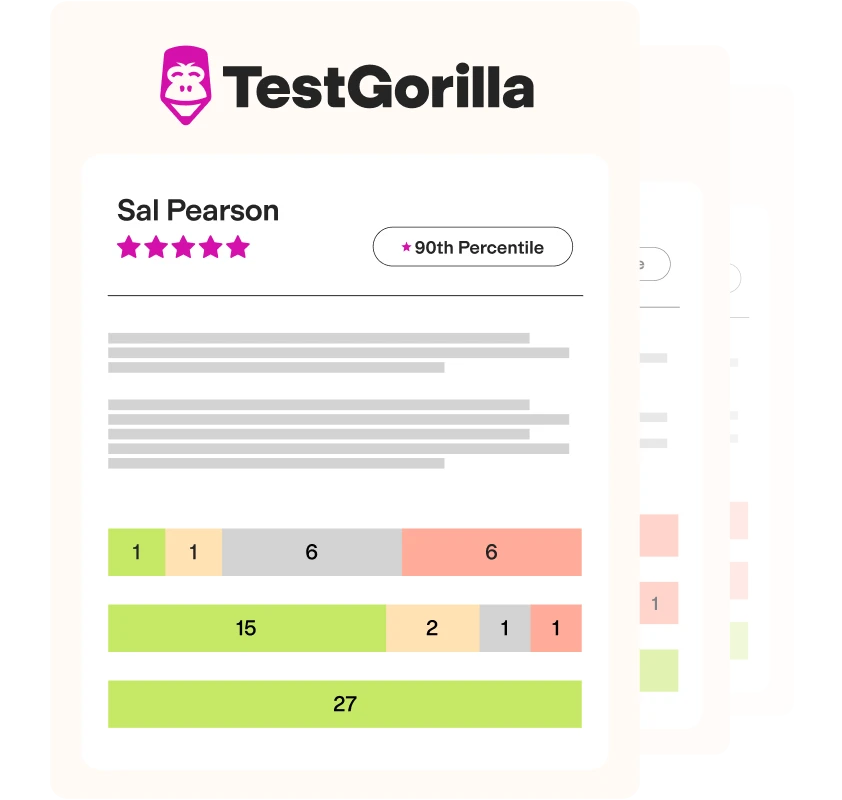Attention to Detail (Textual) test
Summary of the Attention to Detail (Textual) test
Our Attention to Detail skills test evaluates candidates’ ability to focus on textual detail while processing information. It helps companies identify applicants who can thoroughly and carefully handle intricate processes using analytical skills without making critical errors.
Covered skills
Matching information
Comparing statements for differences
Checking the consistency of information
Use our Attention to Detail (Textual) test to hire
Any detail-oriented role, such as accountants, editors, quality assurance specialists, software engineers, data analysts, customer care professionals, and administrators. This test is also well-suited for testing candidates’ overall focus for entry-level jobs.
About the Attention to Detail (Textual) test
Attention to detail is a crucial skill that involves being thorough, meticulous, and focused on small elements or nuances that others might overlook. It prevents:
Grammatical errors that give the impression of unprofessionalism
Numerical and data-entry mistakes that cost your company a lot of money
Our Attention to Detail aptitude test evaluates candidates’ abilities to consider details by presenting them with tasks that require them to match information, compare statements, and check the consistency of information. The test provides insights on candidates’ alertness by asking them to identify errors, omissions, or inconsistencies in the information presented.
This 10-minute assessment test measures how well job seekers identify errors, omissions, or inconsistencies in the information presented. It evaluates their ability to analyze text, follow detailed instructions, and maintain precision while processing data.
Take a look at our preview questions to see this test in action.
Test takers who score well on this attention to detail test are able to process textual information and arrive at the correct answer without losing sight of small details that can have a big impact.
If you’re looking for candidates who are thorough in their work and take careful consideration of every small detail before coming to a conclusion, this is the right test for you. This test is also perfect for checking candidates' overall analytical skills.
The test is made by a subject-matter expert
TestGorilla’s tests are created by subject matter experts. We assess potential subject-matter experts based on their knowledge, ability, and reputation.Before being published, each test is peer-reviewed by another expert, then calibrated using hundreds of test takers with relevant experience in the subject.
Our feedback mechanisms and unique algorithms allow our subject-matter experts to constantly improve their tests.
Anirban C.
The global IT industry has benefited from Anirban’s talents for over two decades. With a flawless reputation that precedes him, Anirban has earned a status as a sought-after agile project manager and consultant. He’s worked internationally as a Senior Project Manager with companies such as Ericsson, IBM, and T-Mobile.
Anirban’s love for learning helps him keep his skills sharp. He holds an MBA and a degree in engineering, is a certified Scrum Master, and has certifications in Prince2 and ITIL.
Reliability: Cronbach’s alpha coefficient = .68
Face validity: Candidates rated this test as accurately measuring their skills (average score of 4.32 out of 5.00).
Criterion-related validity: Candidates with higher scores on this test received higher average ratings from the hiring team during the selection process (r = .13).
For an in-depth look at interpreting test results, please take a look at our Science series articles: How to interpret test fact sheets (part 1): Reliability, and How to interpret test fact sheets (part 2): Validity.
For an explanation of the various terms, please refer to our Science glossary.
Reliability and validity | Sufficient data available | Analyses and checks conducted | Outcome |
|---|---|---|---|
Reliability | ✔ | ✔ | Acceptable |
Content validity | ✔ | ✔ | Acceptable |
Face validity | ✔ | ✔ | Acceptable |
Construct validity | ✔ | ✔ | Acceptable |
Criterion-related validity | ✔ | ✔ | Acceptable |
Group differences | |||
Age differences | Pending | Pending | Pending |
Gender differences | ✔ | ✔ | Acceptable |
Ethnicity differences | Pending | Pending | Pending |
Use TestGorilla to hire the best faster, easier and bias-free
Our screening tests identify the best candidates and make your hiring decisions faster, easier, and bias-free.
Create high-quality assessments, fast
Building assessments is a breeze with TestGorilla. Get started with these simple steps.
Why are attention to detail skills important to employers?
Attention to detail skills help employees follow complex processes or instructions precisely, enabling them to complete tasks efficiently and reduce the likelihood of workplace errors with serious consequences.
Maintaining a high level of meticulousness, care, and accuracy enables employees to:
Meet deadlines
Identify and correct errors
Perform effectively under stress
Minimize risks
Maintain productivity
Ensure high quality of work
Relay information accurately and concisely
Uncovering these traits with an Attention to Detail assessment test is particularly valuable during the hiring process for roles that require precision and careful analysis, such as data entry, finance, quality assurance, and project management.
That’s why Ocean Outdoor UK used our Attention to Detail test and other technical pre-employment assessments to hire people for its finance team. As a result, the company found the right people faster and decreased unsuccessful hires by 44%.
You can measure the benefits of using this test and other talent assessments, regardless of your size and hiring volume, with our recruitment ROI calculator.
3 attention to detail competencies to look for
Although attention to detail is a broad skill, in the workplace, the most important aspects of this skill are:
Identifying errors: Employees who excel in this area ensure their work is accurate and reliable, reducing the need for corrections and revisions. Spotting errors includes identifying typos, grammatical mistakes, data entry errors, and other inaccuracies that impact the quality of work.
Finding inconsistencies: Highly attentive individuals can cross-check information for discrepancies and identify when something doesn’t align with the expected standards. It helps maintain the integrity of data and processes, ensuring that every aspect of work is logical and coherent.
Discovering omissions: Recognizing when important details or steps are missing from a task is crucial for projects that require comprehensive problem-solving and coverage. Employees skilled in this area ensure that work is completed thoroughly and prevent potential issues.
What job roles can you hire with our Attention to Detail online test?
Our Attention to Detail skill assessment identifies candidates who are precise, accurate, and thorough when evaluating textual information, which is vital for many job roles, including but not limited to:
Accountants ensure financial integrity and compliance through accurate financial records and error-free calculations
Editors must pay attention to grammatical errors, inconsistencies, and omissions in text while editing and proofreading to maintain high-quality and professional publications
Quality control and quality assurance specialists make sure products meet specific standards and find defects and deviations, guaranteeing product reliability and customer satisfaction
Software engineers use attention to detail to spot errors and support functional software development
Data analysts require close attention to analyze data accurately and spot trends, which is essential for making informed decisions to streamline business processes
Customer care professionals need to handle customer information accurately and provide real-world solutions to maintain customer trust and satisfaction
Administrators manage schedules, records, and communications to ensure smooth and efficient office operations
Keep in mind that our Attention to Detail test evaluates attention to detail in a textual context. For certain roles, like graphic designers, architects, and product inspectors, you should use our Attention to Detail test (Visual) instead to evaluate candidates’ skills, such as how well they concentrate on visual information.
Create a multi-measure assessment: 4 tests to pair with the Attention to Detail (Textual) test
To better understand your applicants, you should use our multi-measure assessment builder and pair the Attention to Detail test with other tests to evaluate jobseekers’ skill sets more thoroughly.
You can combine up to five different skills tests into a comprehensive assessment, including role-specific, personality, situational judgment, and aptitude tests.
Try these four together with the Attention to Detail online test to hire talented candidates:
Reading Comprehension test: Evaluate how well people understand and interpret written information. Attention to detail ensures applicants don’t miss important small details when reading a document.
Numerical Reasoning test: Assess applicants’ proficiency in handling numerical data, which is essential for positions that require data analysis and financial calculations. Keen attention means applicants spot and eliminate inconsistencies and numerical errors.
Motivation test: Understand what drives individuals to ensure they remain happy and engaged in their future roles. Find a motivated, attentive employee who is engaged and comfortable working alone or in teams.
Data-Driven Decision Making test: Determine candidates’ ability to make informed decisions based on analytical and strategic thinking. This empowers you to pick workers with a sharp eye for emerging trends.
Note: The last employment test on this list is an analytical role-specific skills test. We have included it because these two skills are typically assessed together. However, if you’re hiring for a non-analytical role (like an editor), please replace it with a more suitable role-specific test to ensure your candidates possess the right abilities for the job.
FAQs
View a sample report
The Attention to Detail (Textual) test will be included in a PDF report along with the other tests from your assessment. You can easily download and share this report with colleagues and candidates.







